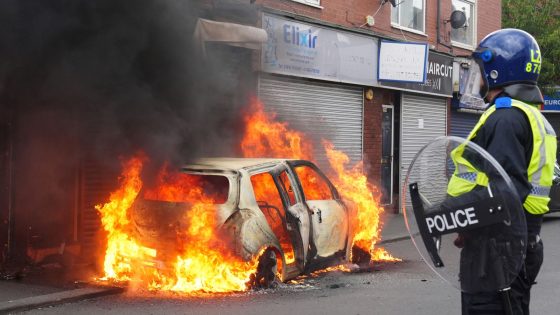A 14-year-old boy who took part in the UK riots was so sternly told off by his parents that police and prosecutors decided to take no further action.
Stephen Parkinson, director of public prosecutions (DPP), said it was decided that the “wrath that had been visited on that child by his parents”, who had marched him to the police station after realising he took part in the disorder, was more effective than any punishment the criminal justice system could deliver.
Mr Parkinson added that, in contrast, other families had treated joining the disorder as a “day out”.
Riots broke out across the UK this summer, with mosques and hotels housing asylum seekers targeted, after three girls were stabbed to death in Southport.
Hundreds of people have been sentenced for their roles in the nationwide disorder, which followed online misinformation that the Southport knife attacker was an asylum seeker who arrived in the UK by boat. It later turned out the teenage suspect was born in Wales.
Speaking about the aftermath of the disorder, where fast-track courts were set up to prosecute rioters, Mr Parkinson said: “We’ve come across instances, anecdotally, of families regarding it as a day out, to go and just join in the disorder.
“But conversely, we had an instance where a family marched their 14-year-old to the police station, having seen on social media that that individual had been involved in the disorder.
“And actually, we took the decision that the wrath that had been visited on that child by his parents was more effective than anything the criminal justice system could deliver.
“And so we took no further action.”
Mr Parkinson, who took up the post as head of the Crown Prosecution Service (CPS) in November last year, said prosecutors are “very alive” to the risk of children being criminalised unnecessarily after becoming involved in the riots.
One of the youngest defendants was a 12-year-old boy, who hit the headlines because his mother chose to fly to Ibiza for a holiday the day before he was due in court.
District Judge Joanne Hirst ordered her to appear at Manchester Magistrates’ Court after her holiday, where she was told to pay £1,200 compensation and go on a parenting course.
The boy was given a 12-month referral order after admitting two counts of violent disorder, a measure designed to prevent him from committing further crimes.
“Sometimes the state, I’m afraid, has to intervene,” Mr Parkinson said.
“And the consequence of an intervention like the 12-year-old is a referral order, which would then mean that rehabilitation can take place and we can divert them from the path of criminality.
“That’s the objective with youngsters, not to criminalise them, it’s to put them on the right path.
“We have people who are specially trained around youth work, because it’s important we do make the right decisions.”
More than 600 people have been charged over this summer’s riots so far, according to information provided by police and prosecutors to the Press Association.
Of these, more than 530 are adults and more than 75 are children under the age of 18, about 13% of the total.
Read more from Sky News:
Amber weather warning in place for millions
Hezbollah deputy gives chilling warning to West
See who’s eligible for vaccines after ‘tripledemic’ warning
“It’s very troubling that youngsters have been being sucked into this and, you know, I’m fully alive to the consequences of a conviction on someone’s life,” Mr Parkinson went on.
“So we do have to think very carefully about the decisions we take.
“But sometimes the state does need to intervene, not to mark criminality with a record, unfortunately that’s a consequence, but in order to open the possibility of diverting away from the future path.”
Source Agencies






